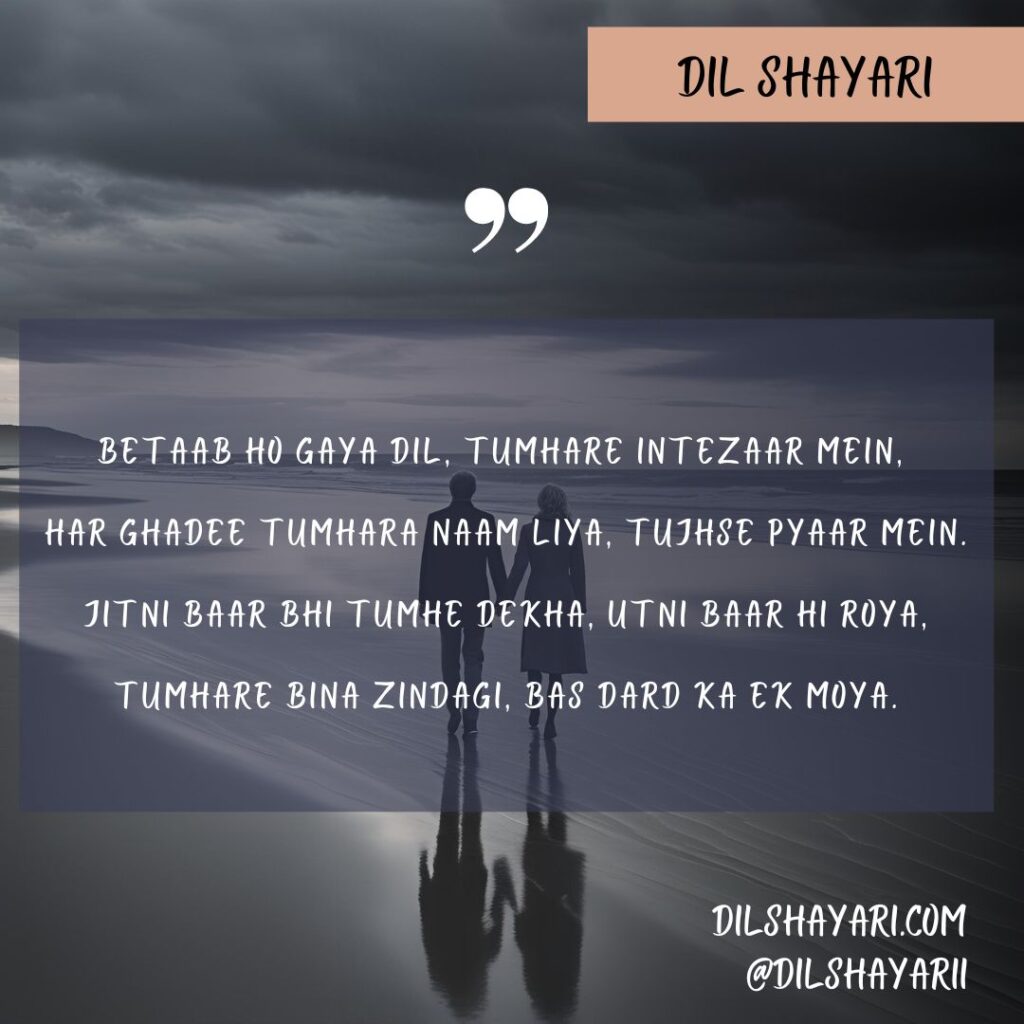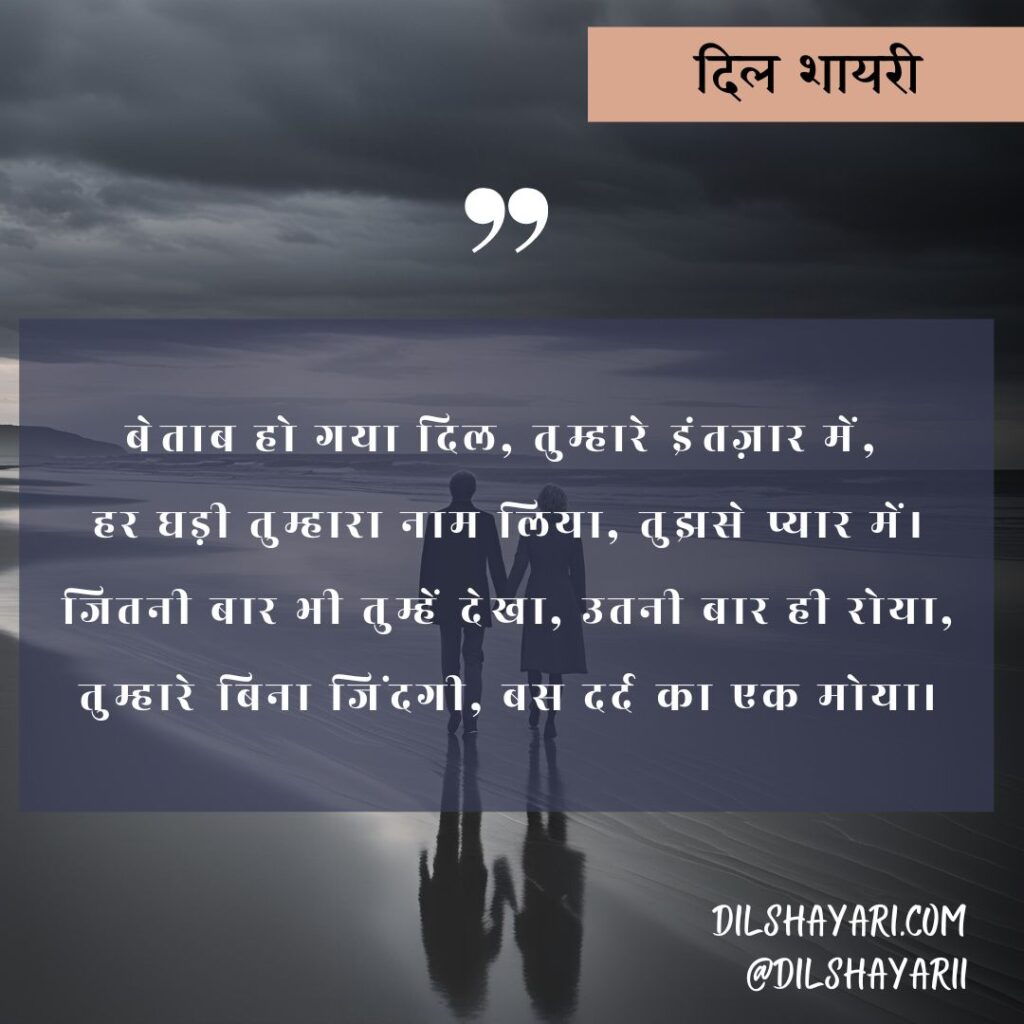
Betaab Ho Gaya Dil, Tumhare Intezaar Mein,
Har Ghadee Tumhara Naam Liya, Tujhse Pyaar Mein.
Jitni Baar Bhi Tumhe Dekha, Utni Baar Hi Roya,
Tumhare Bina Zindagi, Bas Dard Ka Ek Moya.

बेताब हो गया दिल, तुम्हारे इंतज़ार में,
हर घड़ी तुम्हारा नाम लिया, तुझसे प्यार में।
जितनी बार भी तुम्हें देखा, उतनी बार ही रोया,
तुम्हारे बिना जिंदगी, बस दर्द का एक मोया।

My Heart Has Become Desperate, Waiting For You,
I Took Your Name Every Moment, In Love With You.
Every Time I Saw You, I Cried Every Time.
Life Without You Is Just A Bundle Of Pain.
Betaab Ho Gaya Dil, Tumhare Intezaar Mein,
Har Ghadee Tumhara Naam Liya, Tujhse Pyaar Mein.
Jitni Baar Bhi Tumhe Dekha, Utni Baar Hi Roya,
Tumhare Bina Zindagi, Bas Dard Ka Ek Moya.
The poem you’ve shared is an evocative expression of love, longing, and the inevitable sorrow that accompanies separation. It expresses the depth of feelings that come with waiting for someone you truly love in straightforward yet impactful terms. Let’s break down the poem and explore its meaning in greater detail.
“Betaab Ho Gaya Dil, Tumhare Intezaar Mein” – First Line:
“Betaab Ho Gaya Dil, Tumhare Intezaar Mein”
Translation: My heart became restless, waiting for you.
This opening line introduces the emotional state of the speaker. In addition to expressing restlessness. The term “betaab” also carries a hint of feverish longing. An urgent need for reunion with the beloved. The speaker is in a state of emotional turmoil because of the prolonged wait for the person they love. This is not merely a passive feeling; rather. It’s a one that stirs the heart, making it yearn for the moment when they can be together again.
One frequently experiences a mixture of excitement, impatience, and anticipation when waiting for a loved one. This line succinctly captures that restlessness, showing how love can make time seem unbearable. It highlights the deep emotional connection the speaker feels, one that leaves them incomplete and uneasy without the presence of their beloved.
“Betaab Ho Gaya Dil” – Second Line:
“Har Ghadee Tumhara Naam Liya, Tujhse Pyaar Mein”
Translation: In every moment, I whispered your name, lost in love with you.
This is where the speaker’s affection is even more evident. “Har ghadee” means “every moment,” implying that the speaker’s beloved is the only thing on their mind. It’s not just once in a while that they think of the person they love, but in every moment—showing how intense and all-encompassing their feelings are.
The phrase “tumhara naam liya” suggests that the speaker finds solace in repeating the beloved’s name. In love, this act of calling out or thinking of the person you love becomes a form of emotional release, almost like a prayer. The speaker’s devotion is so strong that even the mere mention of their beloved’s name brings comfort in the face of separation. It’s a reflection of the speaker’s deep emotional investment and how love has become the very fabric of their existence.
Third Line:
“Jitni Baar Bhi Tumhe Dekha, Utni Baar Hi Roya”
Translation: Every time I saw you, I shed tears once more.
This line brings out the pain and vulnerability that the speaker feels. It’s not just the absence of the beloved that causes sorrow, but even their presence evokes tears. There are several ways to read this. First, the speaker might be crying because seeing the beloved reminds them of the fact that they cannot always be together. Each glance at the person they love is bittersweet—it brings joy but also the reminder of eventual separation.
Alternatively, the tears may also represent the overwhelming nature of love itself. Sometimes, love is so powerful that it brings people to tears, not out of sadness but out of the sheer intensity of feeling. However, the repetition of “utni baar hi roya” (I cried each time). Hints at a deeper sorrow—possibly unrequited love. Or the knowledge that their love cannot be fully realized. The tears are a testament to the emotional weight the speaker carries.
Fourth Line:
“Tumhare Bina Zindagi, Bas Dard Ka Ek Moya”
Translation: Without you, life is just a cradle of sorrow.
This final line wraps up the central theme of the poem—life without the beloved is unbearable. “Zindagi” (life) and “dard” (pain) are juxtaposed to show. How intertwined the speaker’s emotions are with the presence of their beloved. The word “moya” refers to something soft and fragile, like a delicate cradle or a cloud of misery. It’s a beautiful metaphor to express how life without the beloved feels fragile and filled with nothing but sorrow.
The speaker feels that without the person they love, life loses its meaning and becomes a vessel of pain. This sentiment is often found in classical poetry.
Where the lover’s existence is so closely tied to their beloved. That being apart leads to an unbearable, empty existence. The word “moya” softens the intensity of the suffering but still conveys the persistent and all-encompassing nature of the sadness.
Overall Themes:
- Love and Longing:
The dominant theme of the poem is the longing for the beloved. Each line captures the intense emotions that come with waiting and hoping for the person you love. This is a universal feeling that many people in love experience—feeling incomplete without the presence of the one they love. - Sorrow and Separation:
The second prominent theme is sorrow. Especially the pain that comes from being separated from the beloved. While the speaker is deeply in love, the love also brings great sadness. As they are not always with the person they desire. This sorrow is expressed through the imagery of tears and the description of life as a cradle of pain. - Devotion:
The poem also reflects deep devotion. The speaker doesn’t just love the person but is consumed by that love. Every moment is filled with thoughts of the beloved, and they find solace in uttering their name. This level of devotion is a hallmark of passionate love, where the lover’s world revolves around the beloved. - Bittersweet Emotion:
There’s a bittersweet quality to the entire poem. Even though love is present, it’s accompanied by pain and sorrow. This juxtaposition of joy and sadness gives the poem a melancholic beauty, as the speaker navigates the complex emotions that come with intense love.
Conclusion:
In essence, the poem captures the profound emotional journey of a person deeply in love but also deeply pained by separation. The poet masterfully intertwines love, devotion, longing, and sorrow, making each line a reflection of the speaker’s inner turmoil. The repetition of sorrow with each glance, the restlessness in waiting, and the constant utterance of the beloved’s name all serve to show how all-consuming this love is. Life without the beloved is reduced to an existence of pain, and the speaker finds themselves trapped in this cradle of sorrow until they are reunited.

